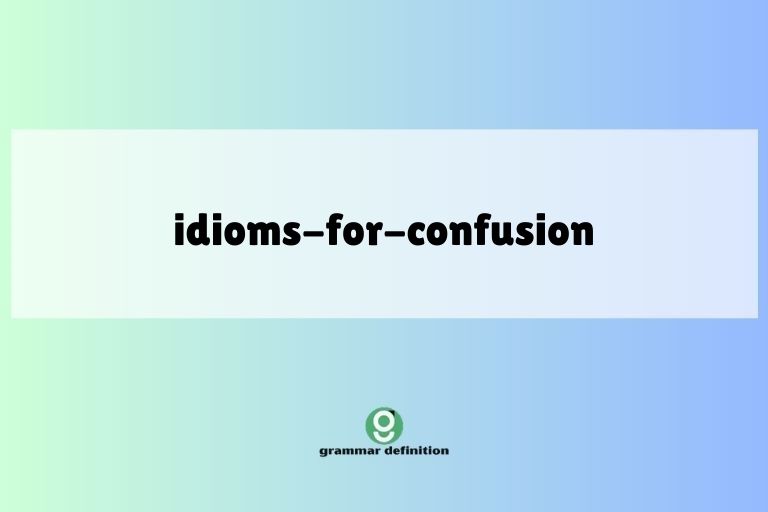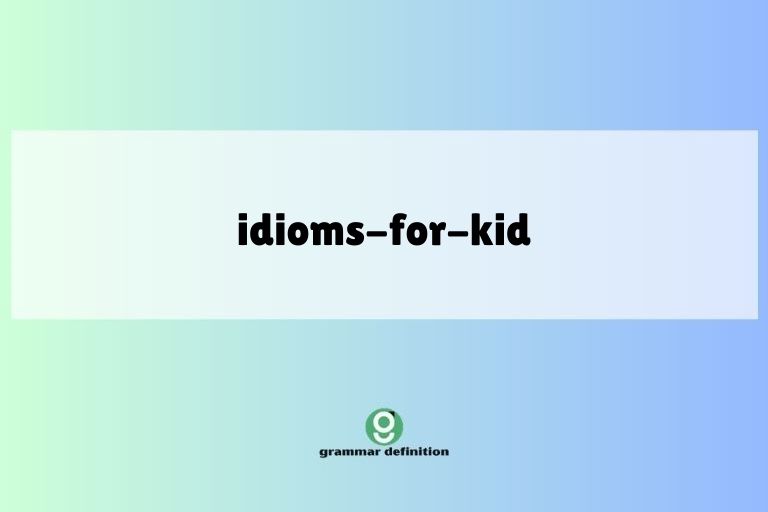Lost in Translation: Mastering Idioms for Confusion

Understanding idioms is crucial for mastering English, particularly when navigating the nuances of everyday conversation. Idioms related to confusion are especially important because they add color and depth to our expressions, allowing us to convey complex feelings of bewilderment and uncertainty in a concise and relatable way.
This article aims to provide a comprehensive guide to idioms that express confusion, helping learners grasp their meanings, usage, and cultural contexts. Whether you’re an ESL student, a language enthusiast, or simply looking to enhance your communication skills, this guide will equip you with the knowledge to confidently understand and use these idioms.
By delving into the world of idioms for confusion, you’ll not only expand your vocabulary but also gain a deeper understanding of how native English speakers express themselves. This knowledge will improve your comprehension skills, allowing you to follow conversations more easily and appreciate the richness of the English language.
Furthermore, using these idioms correctly will make your own speech more expressive and natural, helping you connect with others on a deeper level.
Table of Contents
- Introduction
- Definition of Idioms for Confusion
- Structural Breakdown of Idioms
- Types and Categories of Idioms for Confusion
- Examples of Idioms for Confusion
- Usage Rules for Idioms
- Common Mistakes with Idioms
- Practice Exercises
- Advanced Topics in Idiomatic Usage
- Frequently Asked Questions
- Conclusion
Definition of Idioms for Confusion
An idiom is a phrase or expression whose meaning cannot be understood from the literal meanings of its individual words. Instead, the phrase has a figurative meaning that is unique to the language or culture in which it is used.
Idioms related to confusion are specific phrases that convey a state of bewilderment, uncertainty, or misunderstanding. They offer a more colorful and nuanced way to express these feelings than simple, literal descriptions.
These idioms often rely on metaphors, similes, or other figures of speech to create a vivid image in the listener’s mind. For example, the idiom “to be in a fog” doesn’t literally mean that someone is surrounded by mist; rather, it suggests that they are mentally unclear or disoriented.
Understanding the figurative meaning and the cultural context of these idioms is essential for effective communication.
Idioms for confusion can be classified based on the type of imagery they evoke or the specific nuance of confusion they express. Some idioms might describe a general state of bewilderment, while others might suggest a more specific feeling of being misled or deceived.
Recognizing these subtle differences is key to using idioms accurately and appropriately.
Structural Breakdown of Idioms
Idioms, by their nature, often defy standard grammatical rules. Their structure is fixed, meaning that the words cannot be changed or rearranged without altering the idiom’s meaning or rendering it nonsensical.
This rigidity is one of the key characteristics that distinguish idioms from other types of phrases.
Many idioms consist of a verb and a prepositional phrase, such as “to be at sea” or “to be in a muddle.” Others might involve a simile, comparing a state of confusion to something else, like “as clear as mud.” Still others may involve common objects or situations that are used metaphorically to represent confusion.
Understanding the structural elements of an idiom can sometimes provide clues to its meaning, although this is not always the case. More often, the meaning is derived from the cultural and historical context in which the idiom originated.
Therefore, it’s important to learn idioms as complete units, rather than trying to dissect them grammatically.
Types and Categories of Idioms for Confusion
Idioms for confusion can be categorized based on the specific aspect of confusion they describe. Here are a few common categories:
General Bewilderment
These idioms express a general feeling of being confused or disoriented, without specifying any particular cause or reason.
Misunderstanding
These idioms suggest that someone has failed to understand something correctly or has been misled in some way.
Uncertainty
These idioms convey a feeling of doubt or lack of clarity about a situation or decision.
Mental Fog
These idioms describe a state of mental cloudiness or inability to think clearly.
Being Deceived
These idioms suggest that someone has been tricked or misled intentionally.
Examples of Idioms for Confusion
Here are several examples of idioms for confusion, organized by category, along with their meanings and example sentences. Understanding these idioms will greatly enhance your ability to both understand and express confusion in English.
General Bewilderment
The following table provides examples of idioms that describe a general state of bewilderment. These idioms are versatile and can be used in various contexts to express a feeling of being lost or disoriented.
| Idiom | Meaning | Example Sentence |
|---|---|---|
| At sea | Confused or uncertain | I’m completely at sea with these new regulations. |
| In a fog | Mentally unclear or disoriented | After the accident, he was in a fog for several days. |
| In a daze | Confused and unable to think clearly | She walked around in a daze after hearing the news. |
| In a muddle | Confused and disorganized | My thoughts are all in a muddle after that long meeting. |
| Lost the plot | Lost track of what’s happening or what’s being discussed | I think he’s completely lost the plot; he’s talking about something totally unrelated. |
| Baffled | Confused or perplexed | The complex instructions left me utterly baffled. |
| Bewildered | Confused and slightly lost | She looked bewildered by the sudden change of plans. |
| Flummoxed | Confused and unable to find a solution | The unexpected question completely flummoxed him. |
| Perplexed | Completely baffled; very puzzled | I was perplexed by the ambiguous wording of the contract. |
| Discombobulated | Confused and disconcerted | The loud noise discombobulated her for a moment. |
| All at sea | Completely confused or uncertain | He was all at sea when trying to assemble the furniture. |
| In a spin | Confused and agitated | The sudden changes sent her into a spin. |
| In the dark | Uninformed or unaware | They kept me in the dark about the project’s progress. |
| Out of it | Not fully aware or alert | He was completely out of it after taking the medication. |
| Blanking out | Temporarily unable to remember something | I was so nervous that I started blanking out during the presentation. |
| Not have a clue | To have no idea or understanding | I don’t have a clue what he’s talking about. |
| Beats me | I don’t know | “Where did she go?” “Beats me!” |
| Beyond me | Too difficult to understand | Quantum physics is completely beyond me. |
| It’s all Greek to me | Impossible to understand | The technical jargon was all Greek to me. |
| Head is spinning | Feeling overwhelmed and confused | After the long presentation, my head was spinning. |
| Lost for words | Unable to speak because of surprise or confusion | I was lost for words when I heard the news. |
| Mind-boggling | Overwhelmingly complex or confusing | The amount of data was mind-boggling. |
Misunderstanding
The following table provides examples of idioms that describe instances of misunderstanding. These idioms highlight situations where communication has broken down or where someone has interpreted something incorrectly.
| Idiom | Meaning | Example Sentence |
|---|---|---|
| Get the wrong end of the stick | Misunderstand something | He got the wrong end of the stick and thought I was criticizing him. |
| Mix up | Confuse two or more things | I always mix up their names. |
| Cross wires | Have a misunderstanding due to miscommunication | There must have been crossed wires somewhere, because I was expecting something completely different. |
| Lost in translation | Meaning is lost or altered when translated from one language to another | A lot of the humor was lost in translation. |
| Talking at cross purposes | Talking about different things without realizing it | We were talking at cross purposes; I was talking about the past, and she was talking about the future. |
| Miss the point | Fail to understand the important part of something | He completely missed the point of my argument. |
| Not on the same wavelength | Not understanding each other | We’re just not on the same wavelength; we never seem to agree on anything. |
| Take something the wrong way | Misinterpret something as offensive or negative | I didn’t mean to offend her, but she took my comment the wrong way. |
| Get your wires crossed | To be confused or mistaken about something | I think you’ve got your wires crossed; I never said that. |
| Barking up the wrong tree | Pursuing the wrong course of action or asking the wrong person | If you think I’m the one who stole your pen, you’re barking up the wrong tree. |
| Read between the lines | Understand the hidden meaning behind words | You have to read between the lines to understand what he really means. |
| Miss the boat | Miss an opportunity or not understand something in time | If you don’t apply now, you’ll miss the boat. |
| Miss the mark | Fail to achieve the intended goal or understanding | His attempt at humor completely missed the mark. |
| Misconstrue | Interpret incorrectly | My words were misconstrued by the media. |
| Fail to grasp | Unable to understand | He failed to grasp the complexity of the situation. |
| Over someone’s head | Too difficult for someone to understand | The lecture was completely over my head. |
| Not register | Not understood or noticed | The warning didn’t register with him until it was too late. |
| Come amiss | Be misunderstood or misinterpreted | His comment came amiss and caused an argument. |
| Lost in the shuffle | Forgotten or overlooked due to confusion | The important details got lost in the shuffle. |
| Not click | Not understand immediately | It didn’t click for me until he explained it again. |
Uncertainty
The following table provides examples of idioms that convey a feeling of uncertainty. These idioms are useful for expressing doubt or a lack of clarity about a situation or decision.
| Idiom | Meaning | Example Sentence |
|---|---|---|
| Up in the air | Uncertain or undecided | Our travel plans are still up in the air. |
| In two minds | Unable to decide between two options | I’m in two minds about whether to accept the job offer. |
| On the fence | Undecided | I’m still on the fence about which car to buy. |
| Don’t know whether I’m coming or going | Confused and disorganized | I’ve been so busy lately, I don’t know whether I’m coming or going. |
| Touch and go | Uncertain outcome | The surgery was touch and go, but he pulled through. |
| Question mark | Something that is uncertain or doubtful | The future of the project is still a question mark. |
| Hazy | Unclear or vague | The details of the event are still hazy in my memory. |
| Muddy the waters | Make something more confusing | His explanation only muddied the waters further. |
| Leave you guessing | Not provide enough information, causing uncertainty | The ending of the movie will leave you guessing. |
| Dicey | Risky or uncertain | The weather conditions are looking dicey for our hike. |
| Left field | Unexpected or unusual, causing confusion | His response came completely out of left field. |
| Up for grabs | Available but uncertain | The last ticket is still up for grabs. |
| Shakey ground | Uncertain or unstable situation | The company is on shakey ground financially. |
| A toss-up | An even chance of two outcomes | The game is a toss-up; either team could win. |
| Hit or miss | Unpredictable or inconsistent | The restaurant’s quality is hit or miss. |
| Gray area | Unclear or undefined | The rules about overtime are a gray area in our company. |
| In limbo | In an uncertain or undecided state | Our application is currently in limbo. |
| Wait and see | Adopt a passive attitude and wait to see what happens | We’ll just have to wait and see what the future holds. |
| A shot in the dark | A wild guess | Applying for the scholarship was a shot in the dark, but I got it! |
| Go out on a limb | Take a risk with an uncertain outcome | I’m going out on a limb and predicting they’ll win the game. |
Mental Fog
The following table provides examples of idioms that describe a state of mental cloudiness or an inability to think clearly. These idioms are useful for describing moments when one’s cognitive abilities are impaired, whether due to stress, fatigue, or other factors.
| Idiom | Meaning | Example Sentence |
|---|---|---|
| Brain is fried | Unable to think clearly due to overwork or stress | After studying all night, my brain is completely fried. |
| Mind went blank | Unable to remember anything | When I got up on stage, my mind went completely blank. |
| Not thinking straight | Unable to think clearly or logically | I wasn’t thinking straight when I made that decision. |
| Foggy brain | A state of mental confusion or lack of focus | I’ve had a foggy brain all day; I can’t seem to concentrate. |
| In a mental haze | A state of mental confusion | The lack of sleep has left me in a mental haze. |
| Space out | Become distracted or inattentive | I tend to space out during long meetings. |
| Out to lunch | Not paying attention or not understanding | He seems to be completely out to lunch today. |
| Slow on the uptake | Slow to understand something | I’m a little slow on the uptake sometimes, so please explain it again. |
| Scatterbrained | Disorganized and forgetful | She’s a bit scatterbrained, but she’s very creative. |
| Brain fart | A temporary mental lapse | I had a complete brain fart and forgot her name. |
| Lost my train of thought | Forgot what you were talking about | I’m sorry, I lost my train of thought. |
| Head in the clouds | Daydreaming or impractical | She always has her head in the clouds. |
| Dumbfounded | So amazed that one is unable to speak | I was dumbfounded by his sudden announcement. |
| Shell-shocked | Stunned or dazed | The team was shell-shocked after their defeat. |
| Rattled | Nervous and confused | He was rattled by the unexpected question. |
| In a stupor | A state of near-unconsciousness or insensibility | He sat in a stupor after the shock. |
| Numb | Lacking emotion or feeling | I felt numb after hearing the news. |
| Zoned out | Become unaware of one’s surroundings | I completely zoned out during the movie. |
| In another world | Distracted or not paying attention | She seems to be in another world today. |
| Checked out | Mentally withdrawn or disinterested | He completely checked out of the conversation. |
Usage Rules for Idioms
Using idioms correctly requires an understanding of their specific meanings, contexts, and grammatical structures. Here are some general rules to keep in mind:
- Learn idioms in context: Don’t just memorize the definition of an idiom; try to understand how it is used in real-life situations.
- Consider the audience: Some idioms are more formal than others, and some may be specific to certain regions or cultures. Choose idioms that are appropriate for your audience and the situation.
- Don’t mix idioms: Avoid combining parts of different idioms, as this can create nonsensical or confusing phrases.
- Pay attention to word order: The words in an idiom are usually fixed, and changing the order can alter the meaning or make the idiom sound unnatural.
- Use idioms sparingly: While idioms can add color to your language, using too many can make your speech sound forced or unnatural.
Common Mistakes with Idioms
One common mistake is taking idioms literally. For example, someone might misunderstand “get the wrong end of the stick” to mean physically holding a stick incorrectly, rather than misunderstanding a situation.
Another frequent error is altering the words of an idiom. Idioms are fixed expressions, and changing the words usually makes them nonsensical.
For instance, saying “catch the wrong end of the stick” instead of “get the wrong end of the stick” is incorrect.
Mixing up similar idioms is also a common mistake. For example, confusing “in a fog” with “in a daze” can lead to miscommunication, as the two idioms have slightly different nuances of meaning.
Finally, using idioms inappropriately in formal settings can be a mistake. Some idioms are more casual and should be avoided in formal writing or presentations.
Below are some examples of common mistakes made with idioms, and their corrections:
| Incorrect | Correct | Explanation |
|---|---|---|
| I’m catching the wrong end of the stick. | I’m getting the wrong end of the stick. | The correct idiom is “get the wrong end of the stick.” |
| He is at the sea with the new rules. | He is at sea with the new rules. | The correct idiom is “at sea.” |
| She is in a fog of confusion. | She is in a fog. | The phrase “of confusion” is redundant; “in a fog” already implies confusion. |
| I have lost the plot line. | I have lost the plot. | The correct idiom is “lost the plot.” |
| My brain is frying tonight. | My brain is fried. | The correct idiom is “brain is fried.” |
| The plans are up on the air. | The plans are up in the air. | The correct idiom is “up in the air.” |
Practice Exercises
Test your understanding of idioms for confusion with these practice exercises. Choose the correct idiom to complete each sentence.
Exercise 1: Fill in the Blanks
Choose the correct idiom from the list to complete each sentence. (at sea, in a fog, lost the plot, get the wrong end of the stick, up in the air)
- I’m completely ________ with these instructions; can you help me?
- He seems to have ________; he’s talking about something completely unrelated.
- She ________ and thought I was criticizing her, but I was only trying to help.
- Our travel plans are still ________; we haven’t decided where to go yet.
- After the accident, he was ________ for several days.
Answers:
- at sea
- lost the plot
- got the wrong end of the stick
- up in the air
- in a fog
Exercise 2: Multiple Choice
Choose the correct meaning of the idiom in each sentence.
- He’s completely out to lunch today.
- He is eating lunch.
- He is not paying attention.
- He is going to lunch.
- I’m in two minds about whether to go to the party.
- I have two different thoughts.
- I can’t decide.
- I have two friends going.
- The lecture was completely over my head.
- The lecture was too loud.
- I didn’t understand the lecture.
- The lecture was boring
- I had a complete brain fart and forgot her name.
- I had a good idea.
- I had a temporary mental lapse.
- I had a headache.
- He’s barking up the wrong tree
- He’s yelling at a tree
- He is pursuing the wrong course of action
- He’s lost in the woods
Answers:
- b
- b
- b
- b
- b
Exercise 3: True or False
Determine whether the following sentences are true or false, based on the correct usage of idioms.
- “I’m getting the wrong end of the stick” means you are understanding the situation correctly. (True/False)
- “To be at sea” means to be confused or uncertain. (True/False)
- “My brain is fried” means you are well rested. (True/False)
- “Our plans are up in the air” means our plans are decided. (True/False)
- “He’s talking at cross purposes” means they are in agreement. (True/False)
Answers:
- False
- True
- False
- False
- False
Advanced Topics in Idiomatic Usage
For advanced learners, understanding the nuances of idiomatic usage can significantly enhance their communication skills. Delving into the historical and cultural contexts of idioms provides a deeper appreciation for their meaning and usage.
For example, understanding the origin of the idiom “get the wrong end of the stick” can provide insight into why it is used to express misunderstanding.
Furthermore, exploring regional variations in idiomatic expressions can help learners navigate different dialects and accents of English. Some idioms may be more common in British English than American English, or vice versa.
Being aware of these differences can prevent misunderstandings and enhance cross-cultural communication.
Finally, mastering the art of using idioms creatively and appropriately can add a unique flair to one’s writing and speaking. This involves not only using idioms correctly but also adapting them to fit specific contexts and purposes.
However, it’s important to exercise caution and avoid overusing idioms, as this can make one’s language sound unnatural or forced.
Frequently Asked Questions
- What is an idiom?
An idiom is a phrase or expression whose meaning cannot be understood from the literal meanings of its individual words. Instead, it has a figurative meaning that is unique to a particular language or culture. For example, “kick the bucket” is an idiom that means “to die.”
- Why are idioms so difficult to learn?
Idioms are difficult to learn because their meanings are not always obvious from the individual words they contain. Furthermore, idioms are often culturally specific, meaning that their meanings and usages can vary from one culture to another. Learning idioms requires memorization, contextual understanding, and exposure to the language in real-life situations.
- How can I improve my understanding of idioms?
There are several ways to improve your understanding of idioms. One effective method is to read widely and pay attention to how idioms are used in different contexts. You can also use online resources, such as dictionaries and idiom lists, to look up the meanings of unfamiliar idioms. Additionally, practicing using idioms in your own writing and speaking can help you internalize their meanings and usages.
- Are idioms the same in all English-speaking countries?
No, idioms can vary significantly between different English-speaking countries and regions. Some idioms may be common in British English but unfamiliar to speakers of American English, and vice versa. It’s important to be aware of these regional variations and to use idioms that are appropriate for your audience.
- Is it okay to use idioms in formal writing?
In general, it’s best to avoid using idioms in formal writing, as they can make your language sound too casual or informal. However, there may be exceptions to this rule, depending on the specific context and purpose of your writing. When in doubt, it’s always best to err on the side of formality.
- How can I avoid making mistakes when using idioms?
To avoid making mistakes when using idioms, it’s important to learn their meanings and usages thoroughly. Pay attention to the specific words and grammatical structures of idioms, and avoid altering them in any way. Additionally, consider the context in which you are using an idiom and make sure that it is appropriate for your audience and purpose.
- What are some good resources for learning idioms?
There are many excellent resources available for learning idioms, both online and in print. Some popular online resources include idiom dictionaries, idiom lists, and language learning websites. In print, you can find idiom dictionaries, grammar textbooks, and collections of essays and articles that discuss idiomatic usage.
- How do I know when to use an idiom?
Knowing when to use an idiom comes with practice and exposure to the language. Consider the context, your audience, and the overall tone you want to convey. If you’re unsure, it’s often better to opt for clearer, more direct language, especially in formal situations.
Conclusion
Mastering idioms related to confusion is a valuable step toward achieving fluency in English. These expressions add depth and color to your communication, allowing you to express complex emotions and ideas with greater precision.
By understanding the meanings, usages, and cultural contexts of these idioms, you can enhance your comprehension skills, improve your speaking abilities, and connect with native English speakers on a deeper level.
Remember to learn idioms in context, consider your audience, and avoid common mistakes. Practice using idioms in your own writing and speaking, and don’t be afraid to experiment with different expressions.
With dedication and persistence, you can master the art of using idioms for confusion and significantly enhance your communication skills. Always be mindful of the setting, some idioms are informal and should not be used in formal settings.
Continue to explore the rich and diverse world of English idioms, and you’ll find yourself becoming a more confident and effective communicator. Embrace the challenges of learning idioms, and you’ll be rewarded with a deeper understanding of the language and culture.
Good luck, and happy learning!






